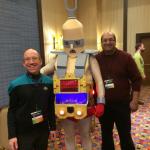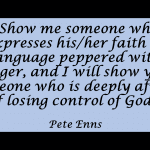Episode 8 of Jodie Whittaker‘s first season as the Doctor, “The Witchfinders,” revisits many familiar tropes from Doctor Who’s old and recent episodes, while introducing a new element into the mix: King James. Yes, none other than King James I, the one for whom the Bible translation is named. Indeed, the influence of his translation on the phenomenon of witch hunts is explicitly acknowledged.
The Doctor says early on that they mustn’t interfere with the fundamental fabric of history. Yaz asks in response, “Even if something’s not right?” They then happen across a witch trial, and the Doctor jumps in the water to try to save the woman.
There is a lot of talk of Satan in the episode, as one would expect, as well as of God. For instance:
“Satan stalks this land. We must continue to root him out and do whatever it takes to save the soul of our village.”
“The trials are sacred. They are the will of God.”
“God will keep me safe, as long as I do his work.”
“…save the souls of my people from Satan, even if it means killing them all.”
The Doctor asks, “How is Satan manifesting himself here?” The things that are mentioned – blighted crops, illnesses, etc. – are things that we can now explain in other terms.
The Doctor pretends to be the “Witchfinder General” when dealing with local landowner Beccah Savage, who is conducting the ducking. She tells the Doctor that horses are banned in their village, Bilehurst, because they are Satan’s creatures. The people of England are depicted as extremely superstitious.
On of the most interesting moments in the episode (not just, I imagine, for me, with my combined interest in Bible and Doctor Who) is when Beccah says “Kill the witches, as King James says in his new Bible.” The reference, is of course, to the verse “You shall not suffer a witch to live.” (Elizabeth Sloane had an interesting article in Haaretz about this last year.) The Doctor remarks that the quote is from the “Old Testament,” and then adds, “There’s a twist in the sequel. Love thy neighbor.” The Doctor thus gives voice to, rather than challenges, the widely held supercessionist view of the Jewish scriptures vs. the Christian New Testament, when her time travel and studies ought to have given her a better vantage point from which she might have known that “Love your neighbor” is in fact from Leviticus, which Jesus was quoting when he said it was one of the greatest commandments.
King James himself shows up and introduces additional complications into the situation. When he scoffs that “A woman could never be the general,” the Doctor says that in fact Graham is the “Witchfinder General.”
We see at one point that Beccah has a copy of a book with the title Daemonologie, an actual book written by King James. The king himself says at one point, “I know everything about Satan.”
When asked if she detects Satan at work, the Doctor replies, “Doubt it, not a big believer in Satan.” Of course, the Doctor actually met Satan, and so there is a certain ambiguity and/or irony in this statement.
Ultimately, as the previously executed women accused of witchcraft reappear, the explanation the Doctor provides is that it is alien mud animating the dead. When it is suggested that this is “Something from hell,” the Doctor responds, “More like from the heavens.” She then soon finds herself accused of being “Satan’s acolyte,” and her reference to the source of what is happening having fallen from the heavens is met with, “It fell like your lord, Lucifer.”
The Doctor does remark that, if she were “still a bloke” she could get a lot more done. But I liked that they didn’t dwell on this more than necessary, and that the Doctor simply spoke and acted in the courageous manner one would expect based on consistent traits of the character regardless of regeneration.
King James is presented as one who seeks to understand the mysteries of existence. The Doctor tells him, “True knowledge has to be earned.” The Doctor knows details about the king’s mother, his troubling life experiences. She confronts him about the darkness inside him. She insists that people are all the same in this particular respect: We want certainty. We want to believe people are heroes and villains. But reality is more complicated, as we know if we stop merely looking at others and look honestly within our own hearts.
The Doctor realizes that Beccah has been pointing the finger at others so that no one points it at her – but only when the Doctor herself is to be ducked, accused of being “the most evil witch in Christendom.”
The alien entity that is not only in the bodies of the executed witches, but also within Beccah, is now revealed as the Morax, while Pendle Hill (the location of a historical series of witch trials) is revealed to have been a prison for an alien army, imprisoned there for war crimes. A sacred tree on the hill was actually ancient alien technology, a biomech security system. The Doctor manages to reactivate the prison so that the hill reabsorbs the Morax.
Given the theme in the episode of what is “biblical” and what is not, it was absolutely perfect that Graham spoke some familiar words which King James thought might be from Ezekiel, but which Graham attributed to Tarantino. The reference, for those who didn’t get it, is to a modified adaptation of Ezekiel 25:17, with added material that is not strictly biblical, that is quoted more than once in the movie Pulp Fiction.
Just before they depart in the TARDIS, the Doctor quotes Clarke’s Third Law, that any sufficiently advanced technology is indistinguishable from magic. And so Doctor Who returns to its most consistent stance regarding such matters: monsters, magic, and the mystical are real, they are just to be explained in terms of advanced alien technology. But in this imaginary world in which science can apparently do anything that people have hoped or imagined that magic might, is this a distinction without a difference? If cutting down a sacred tree can unleash terrifying monsters, then much of superstition is affirmed rather than debunked. That people in centuries past did not know as much as time travelers from other worlds and/or the future could, and so did not know how to solve the problems these alien encounters presented them with, is scarcely blameworthy on their part. When we don’t understand, and no savior with superior knowledge and/or ability comes to our rescue, we try anything we can think of and hope for the best.
On the ambiguity inherent in this depiction of things – magic is at once supposedly “debunked” and yet said to be at the same time literally true on another level, see my posts about “The Daemons,” “The Time Monster,” and “The Awakening,” as well as the one about whether there is a meaningful distinction between a wizard and a time lord.
For fans of classic Doctor Who, there is in fact a novel featuring the First Doctor called The Witch Hunters, with which (or witch) it might be interesting to compare this episode.
















